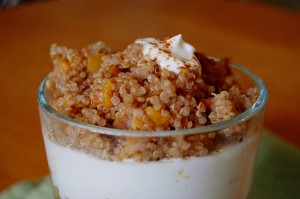Ingredients:
- 1 organic, medium-sized peach
- ½ cup organic quinoa (measured dry)
- 1 cup water
- ½ teaspoon cinnamon
- ¼ teaspoon ground ginger
- 1/8 teaspoon nutmeg
- 1 cup plain, fat-free organic Greek yogurt
- Stevia, honey, or agave to taste (optional)
Directions:
- After washing the peach, cut in half to remove the pit. Dice the peach into small pieces.
- Using a small mesh colander, rinse the dry quinoa with cold water until the water runs clear (this is important to remove the bitter coating naturally found on quinoa!)
- Combine quinoa, water, diced peach, and spices in a small saucepan over medium-high heat until mixture is boiling.
- Once the quinoa mixture is boiling, stir and reduce heat to low and cover the pan. Cook for 15 minutes.
- Allow the quinoa mixture to cool (it can be made ahead of time!).
- To serve: layer half of the quinoa mixture with ½ cup plain, fat-free organic Greek yogurt. If you like your yogurt sweeter, you can sweeten to taste with Stevia or a touch of honey or agave.
Nutrition:
Makes 2 servings. Per serving (using no sweetener or stevia): 289 calories, 3 g fat, 48.8 g carbohydrates, 5.7 g fiber, 19.4 g protein
Peaches: Peaches are antioxidant rich, plentiful in Vitamin C, Vitamin A, beta carotene, lutein, and zeaxanthin. They’re a great source of minerals like iron, fluoride, and potassium. All of these health benefits of peaches can help your connective tissue synthesis, vision, skin, red blood cell formation, heart rate and blood pressure regulation, and can also help prevent cavities.
Quinoa: Quinoa is actually a seed, not a grain, which explains why it has a small fat content. It also contains all essential amino acids, making it an excellent protein source. Quinoa is also a great source of iron, fiber, and magnesium.
Cinnamon: While studies are still being done on the health properties of cinnamon, current studies suggest cinnamon may play a role in lowering blood sugar, particularly in diabetics. Additionally, some studies are hinting that cinnamon may also offer antioxidant effects, fight bacteria, and reduce inflammation.
Ginger: Ginger has been used in holistic medicine as a way to reduce gastrointestinal discomfort. Ginger has been shown to reduce all symptoms of motion sickness, including dizziness, nausea, vomiting, and cold sweats. Ginger is also known as a natural anti-inflammatory, which can be particularly helpful with joint distress/ arthritis. Additionally, ginger is an immune-booster, and has been shown to induce cell death in ovarian cancer cells and protect against colorectal cancer.
Nutmeg: Nutmeg may have anti-fungal, anti-depressant, aphrodisiac, digestive, and carminative (gas reducing) therapeutic properties. It’s a good source of minerals such as a copper, calcium, manganese, iron, zinc, and magnesium. Nutmeg is also a good source of antioxidants and rich in Vitamin C, folic acid, riboflavin, niacin, and Vitamin A.
Greek Yogurt: Greek yogurt has twice as much protein as regular yogurt, less sodium, fewer carbohydrates, and can usually be easier to digest, since there is less sugar (lactose).
Stevia: Stevia is a natural, non-synthetic, zero calorie sugar substitute. Stevia extract is 300 times sweeter than sugar, and the sweet sensation lasts longer than with regular sugar. With its negligible effect on blood sugar, stevia is a great sweetener for someone watching the carbohydrate intake. It has been used Japan, China, and Korea for many years.
Sources:
http://www.nutrition-and-you.com/peaches.html http://vegetarian.about.com/od/healthnutrition/qt/Quinoa-Nutrition-Facts.htm http://www.webmd.com/vitamins-and-supplements/lifestyle-guide-11/supplement-guide-cinnamon http://www.whfoods.com/genpage.php?tname=foodspice&dbid=72 http://www.nutrition-and-you.com/nutmeg.html http://www.utmedicalcenter.org/healthy-tips/87/the-benefits-of-eating-greek-yogurt/
